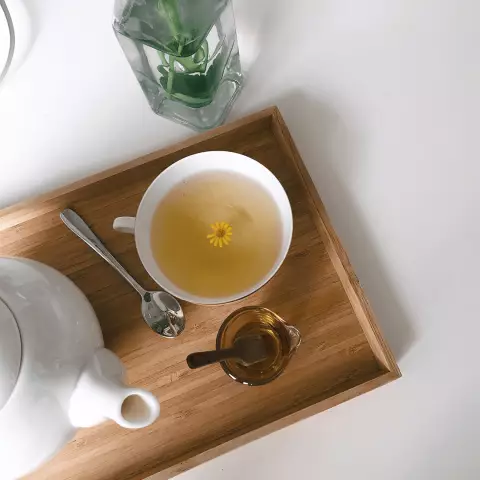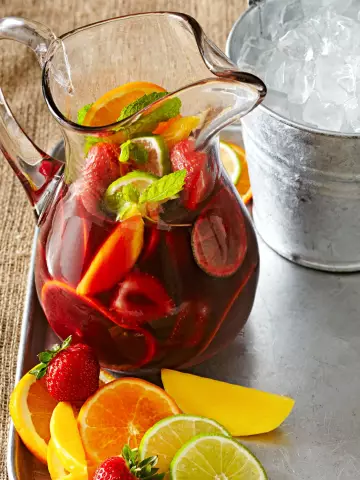- Author Rachel Wainwright wainwright@abchealthonline.com.
- Public 2023-12-15 07:39.
- Last modified 2025-11-02 20:14.
8 unhealthy ways to drink tea
A cup of delicious, aromatic tea not only cheers you up and warms you up on a cold day - this drink is really healthy. Tea leaf infusion contains vitamins B1, B2, C, P, K and PP, flavonoids, tannins, polyphenols, catechins, amino acids and proteins, caffeine, theobromine and theophylline, organic acids and essential oils. Tea is rich in compounds of iron, magnesium, sodium, silicon, manganese, potassium, calcium, fluorine, copper, phosphorus and iodine. And what is most remarkable, almost all useful substances are easily extracted from dry raw materials into infusion. That is why tea has a bactericidal, diuretic, hemostatic, astringent, vasodilating and invigorating effect. It improves the condition of patients suffering from a variety of ailments, and its use has almost no contraindications.
Nevertheless, the "magic drink" can lose its positive properties and even harm the health of a person who does not know the rules of its use. Our article focuses on common mistakes when brewing and drinking tea.

Source: depositphotos.com
Fasting tea
The misconception that you can limit your morning meal to a cup of sweet tea is widespread. People who do this on a regular basis have no idea what harm they are doing to their digestion.
The fact is that tea leaf infusion suppresses gastric secretion. Having drunk it on an empty stomach, you can significantly reduce the amount of gastric juice and bile secreted by the body, and completely discourage your appetite. As a result, the daily diet will be disrupted - you will begin to experience hunger at a completely unusual time. At the same time, many prefer to snack on sweets, eat on the go, but such eating behavior is fraught with unpleasant consequences, the most harmless of which will be gastritis.
If you don't feel like eating in the morning, drink a glass of warm water (possibly with a drop of lemon juice) and go to work, taking your breakfast with you. In this case, you will not harm your body, just the first meal will take place a little later.
Too strong brew
The tea leaf packaging usually indicates the amount required to brew in a given amount of hot water. By increasing this rate by one and a half to two times, you will receive a solution containing an excess concentration of the extracted substances. Excess caffeine will cause overstimulation of the nervous system, increased heart rate, nervousness, and insomnia. An excess of diuretics will lead to dehydration and irrepressible thirst. The astringent effect of tea will manifest itself in the form of digestive troubles, primarily constipation. Continuous drinking of tea that is too strong can seriously impair health.
Hot tea
Many people like to drink tea scalding hot. In fact, freshly brewed tea should cool down a little, and not only so that the leaves give up the beneficial substances to the infusion as fully as possible. Drinks that are too hot burns the lining of the throat, esophagus and stomach, causing inflammation, and regular burns cause scarring. The altered tissues become too susceptible to infections and prone to the development of malignant neoplasms.
Long-term brewing
The tea infusion should not be kept in a tea pot for a long time. If the drink is not consumed within the first 30-60 minutes, it becomes excessively strong and begins to taste bitter. At the same time, the concentration of substances that can harm the body increases, and vitamins and useful organic acids decrease, since they are partially destroyed.
Tea before meals
Drinking tea just before a meal is bad for digestion, not only by suppressing gastric acid production. The tannin contained in the drink is able to bind proteins and prevent their digestion. In addition, a specific aftertaste remains after tea, which distorts the taste of many products. At the same time, some dishes completely lose their attractiveness.
If you really want to drink tea in the middle of the day, make sure that the next meal takes place no earlier than 25-30 minutes later.
Tea after meals
One of the most common mistakes is to end a meal with a cup of tea or wash it down. In these cases, the absorption of proteins is again impaired. In addition, the taste of dishes changes a lot, and not for the better. As a result, both food and tea lose a significant portion of their beneficial properties.
It is recommended to drink tea no earlier than half an hour after a meal. At the same time, you should not add sugar or eat sweets: the body has just received a solid portion of calories, and the additional glucose will definitely be superfluous. It is better to save the sweets for a separate tea party after a few hours.
Yesterday's tea
Tea should be drunk exclusively freshly brewed. The drink, which stood all night, is bitter, overly strong and tasteless. It is practically devoid of nutrients. The overnight sweetened tea is dangerous: pathogenic microorganisms multiply in it that can harm health.
Use with medicines
So, tea leaf infusion is a concentrated mixture of dozens of biologically active substances. Many of them are incompatible with medications. For example, it has been proven that the simultaneous effect of tannin and papaverine or aminophylline on the body negatively affects cardiac activity. Drinking a pharmacy drug with tea, you can achieve a weakening or uncontrolled increase in the therapeutic effect. So, with the simultaneous use of tea, the effect of contraceptives and sedatives decreases and the effect of drugs designed to raise the tone, stimulate physical and mental activity increases.
In the countries of the East with their centuries-old traditions, the tea-drinking ceremony is a verified, strict sequence of certain operations. This is not just a ritual, but a combination of spiritual practices with the optimal way of drinking tea in order to get the maximum benefit and pleasure from it. Our compatriots should be inspired by an example - and if not to organize a daily tea ceremony, then at least not to make dangerous mistakes when drinking a drink.
YouTube video related to the article:

Maria Kulkes Medical journalist About the author
Education: First Moscow State Medical University named after I. M. Sechenov, specialty "General Medicine".
Found a mistake in the text? Select it and press Ctrl + Enter.






